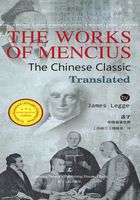
CHAPTER IX
1. Mencius said, 'Po-î would not serve a prince whom he did not approve, nor associate with a friend whom he did not esteem. He would not stand in a bad prince's court, nor speak with a bad man. To stand in a bad prince's court, or to speak with a bad man, would have been to him the same as to sit with his court robes and court cap amid mire and ashes. Pursuing the examination of his dislike to what was evil, wefind that he thought it necessary, if he happened to be standing with a villager whose cap was not rightly adjusted,


4. Of Shun in his early days it is related in the'Historical Records', that 'he ploughed at the Lî (历) mountain, did potter's work on the banks of the Yellow River, fished in the Lêi lake (雷泽), and made various implements on the Shâu hill (寿丘), and often resided at Fû-hsiâ (负夏)'. There will be occasion to consider where these places were, in connexion with some of Mencius's future references to Shun. Dr. Medhurst supposes them to have been in Shan-hsi. See his Translation of the Shû-ching, p. 332.
5. 与 is here in the sense of 助, 'to help'. The meaning is that others, seeing their virtue so imitated,would be stimulated to greater diligence in the doing of it.
CHAPTER 9. PICTURES OF PO-Ȋ AND HÛI OF LIÛ-HSIÂ, AND MENCIUS'S JUDGMENT CONCERNING THEM.
1. Compare chap. ii. 22. In 恶人之朝, 人 refers to the preceding 君, and may be translated prince, but in与恶人立, 人 refers to the preceding 友, and must be translated man. 涂炭, 'mire and charcoal'. 推恶恶之心,—推 is Mencius's speaking in his own person.


to leave him with a high air, as if he were going to be defiled. Therefore, although some of the princes made application to him with very proper messages, he would not receive their gifts.—He would not receive their gifts, counting it inconsistent with his purity to go to them.
2. 'Hûi of Liû-hsiâ was not ashamed to serve an impure prince, nor did he think it low to be an inferior officer. When advanced to employment, he did not conceal his virtue, but made it a point to carry out his principles. When neglected and left without office, he did not murmur. When straitened by poverty, he did not grieve. Accordingly, he had a saying,"You are you,and I am I. Although you stand by my side with breast and aims bare, or with your body naked, how can you defile me?" Therefore, self-possessed, he companied with men indifferently, at the same time not losing himself. When he wished to leave, if pressed to remain in office, he would remain.— He would remain in office, when pressed to do so, not counting it required by his purity to go away.'


思 is the 'thought' of Po-î. 望望然, according to ChûHsi, is 'the appearance of going away without looking round'. Châo Ch'î makes it'the appearance of being ashamed';—not so well. The final 已 gives positiveness to the affirmation of the preceding clause.
2. Hûi of Liû-hsiâ,—see Analects, XV. xiii; XVIII.ii, viii. 与之偕,—the 之 properly refers to the party addressed, 'you are you'.
3. Compare chap. ii. 22. 君子,


3. Mencius said, 'Po-î was narrow-minded, and Hûi of Liû-hsiâ was wanting in self-respect. The superior man will not manifest either narrow-mindedness, or the want of self-respect.'


—by this term we must suppose that Mencius makes a tacit reference to himself, as having proposed Confucius as his model. The writer 韩元少 says:—'Elsewhere Mencius advises men to imitate Ȋ and Hûi,but he is there speaking to the weak and the mean.When here he advises not to follow Ȋ and Hûi, he is speaking for those who wish to do the right thing at the right time.'